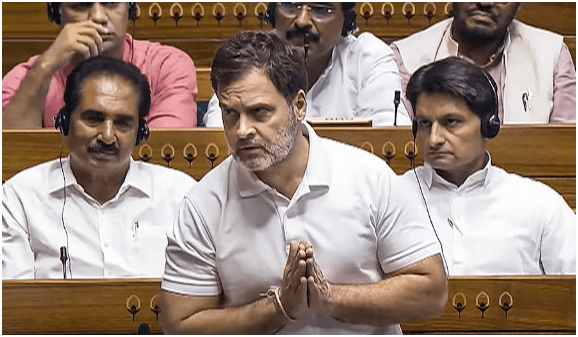Rahul Gandhi’s attack on the BJP in the Lok Sabha was a bold and provocative statement aimed at highlighting the centralization of power within the ruling party.
In a fiery address at the Lok Sabha, Congress leader Rahul Gandhi launched a scathing attack on the Bharatiya Janata Party (BJP), accusing it of being controlled by a small group of influential individuals. Gandhi’s remarks, delivered with characteristic fervor, centered around the notion that the BJP is governed by a “Lotus Chakravyuh” dominated by six people. His speech was aimed at highlighting what he perceives as the centralization of power within the ruling party and its detrimental impact on India’s democracy and governance.
Gandhi began his address by emphasizing the importance of a vibrant democracy where power is decentralized and inclusive. He argued that the BJP’s governance model stands in stark contrast to these democratic ideals, with decision-making concentrated in the hands of a few individuals. This concentration of power, he contended, undermines the democratic fabric of the nation and marginalizes diverse voices and perspectives. The term “Lotus Chakravyuh,” a reference to the BJP’s party symbol and a complex strategic entrapment from Indian mythology, was used to illustrate the entangled and opaque nature of the power dynamics within the party.
Expanding on his accusation, Rahul Gandhi named six individuals whom he believes wield disproportionate influence over the BJP’s policies and direction. Although he refrained from naming these individuals explicitly during his speech, it was clear that he was referring to top leaders and key decision-makers within the party. By focusing on this small group, Gandhi aimed to draw attention to what he sees as an oligarchic structure that prioritizes the interests of a few over the collective good of the country.
Rahul Gandhi critique extended to the BJP’s economic policies, which he argued have favored a handful of powerful industrialists at the expense of the broader population. He cited the growing economic disparities and the concentration of wealth as evidence of the party’s skewed priorities. According to Gandhi, the BJP’s policies have led to the enrichment of a select few while leaving millions of Indians to struggle with economic insecurity and poverty. He accused the government of crony capitalism, where business interests closely aligned with the ruling party receive undue advantages.
In his speech, Rahul Gandhi also addressed the issue of rising unemployment and the agrarian crisis, which have been persistent problems in India. He argued that the BJP’s economic policies have failed to generate sufficient employment opportunities and have neglected the agricultural sector, leading to widespread distress among farmers. Rahul Gandhi linked these failures to the centralized control within the party, suggesting that the lack of diverse input and robust debate has resulted in misguided and ineffective policies.
Rahul Gandhi address was not limited to economic issues; he also touched upon the state of civil liberties and freedom of expression in India. He accused the BJP of stifling dissent and undermining democratic institutions through intimidation and authoritarian tactics. The erosion of press freedom and the suppression of voices critical of the government, he argued, are indicative of a deeper malaise within the country’s political landscape. By centralizing power and curbing democratic freedoms, the BJP is creating an environment of fear and conformity, Gandhi contended.
The response to Gandhi’s speech was predictably polarized. BJP leaders dismissed his accusations as baseless and politically motivated, arguing that the party’s governance is transparent and accountable. They accused Gandhi of attempting to divert attention from the internal challenges facing the Congress party and of failing to provide constructive solutions to the issues he raised. Supporters of the BJP lauded the government’s economic achievements and its efforts to tackle corruption and inefficiency.
However, Rahul Gandhi remarks resonated with many opposition leaders and civil society activists who share his concerns about the centralization of power and the state of democracy in India. They echoed his call for greater accountability and transparency in governance and for policies that genuinely address the needs of the common people. Some analysts viewed Gandhi’s speech as a strategic move to reassert his leadership within the Congress party and to position himself as a key challenger to the BJP in the upcoming elections.
Stay informed with the latest updates-click here
